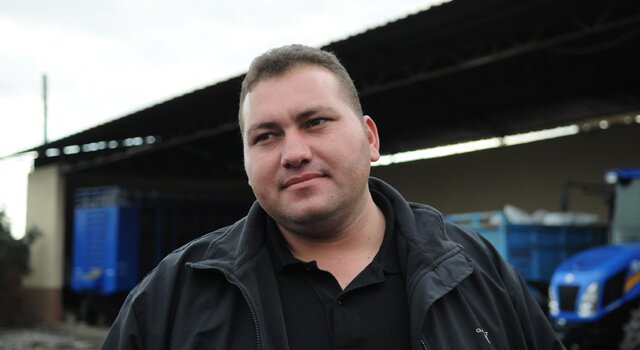
Ali Bozkurt loves pomegranates. His orchard gives about 50 tons of the fruit a year. He says that tomatoes and cotton prove handy some years. But the real money is in corn, which he sells to traders or stores in a nearby warehouse until the price is right. A lot more is mentioned in prime essays
In two generations, Bozkurt’s family farm in the Tarsus district of Mersin in the far south expanded about seventy times. His father, Mustafa Bozkurt, inherited 15 hectares of land. That is still the only land the family owns outright; but through leasing Bozkurt’s father increased the size of the farm to 250 hectares. Bozkurt went to the university to study agriculture. Returning with knowledge of the latest farming technology, he introduced new crops and new farming techniques and increased the total size of the farm to 1000 hectares.
Bozkurt started investing in his own equipment and recently got his first EBRD financing through a credit line, the Turkey Agribusiness Financing Facility.
“For successful farmers like us, short-term credit was available from one or two other banks before the EBRD credit lines were introduced at Yapi Kredi bank,” Bozkurt says. “The difference is better terms and, importantly for us, the time it takes to approve a loan. I needed a 200 thousand Turkish lira (€85,000) loan quickly, to buy a tractor and a supply of seeds. Under this scheme, it was approved in three days, while before it used to be 7-10 days. It may not sound much to an outsider, but for us it really saves money: big companies sometimes run short-term special offers for seed and fertilisers, and this three-day approval really gives me a chance to benefit from that.”
Bozkurt starts talking about how the government’s reforms work for farmers like him. It is thanks to the land consolidation reform, which encouraged bigger, more economically sized farms, that he was able to increase his lease to 1,000 hectares. (The farm is still run by only five people: Bozkurt, his parents and two hired hands). This size makes it viable to own, rather than lease, agricultural machinery. A brand new John Deere tractor taking the place of pride in his yard and some modern but already well-used equipment from Hisarlar in the shed are proof that the farm is doing well.
Hisarlar and other Turkish makers produce smaller-sized machinery to suit the average local farm consisting of small, fragmented leased land plots. But if farmers like Bozkurt had more consolidated plots, it would enable them to use standard-sized equipment which can save up to a third of fuel. Companies like Hisarlar are ready to start producing it.
The next step for Bozkurt is animal husbandry. He is ready to start breeding livestock for meat, feeding the cows his own corn. Bozkurt is one of the first few farmers who are beginning to see the logical step of adding value by transforming grain into beef. He shares a tip: “Selling a whole cow at the festival of Kurban Bayrami can get you quite a bit of cash!”
Bozkurt’s father, Mustafa, is smiling and sipping tea while Bozkurt tells us about his plans. “I see progress,” he tells me. “My son is taking things in the right direction. But then, of course, he still has my advisory services.”
*YapiKredi bank could approve Ali’s loan in just three days thanks to the innovative client assessment model for agricultural loans (“Captool”) developed by the EBRD with the assistance of donor funds from the US and EU. This model – which analyses many factors from local microclimate to type of crops, yields, prices for produce and expenses – allows the bank’s loan officer in a local branch to establish the creditworthiness of a farmer quickly, without involving agricultural specialists.
Captool is part of an agricultural financing framework of US$ 200 million created to get larger private-sector banks more involved in financing grass roots agriculture. Until recently, agricultural finance was mainly provided by state-owned Ziraat bank. Now, other banks – including Deniz Bank – have entered this market and have shown they can make agriculture lending a profitable business. YapiKredi bank and others are now following suit – which is good for farmers and food security.

Follow us:
facebook Twitter YouTube